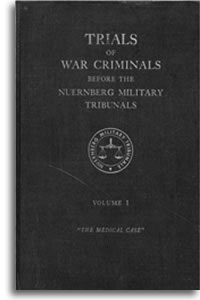John H. E. Fried Papers
by - April 17, 2009
The Department of Special Collections announces the completion of the John H. E. Fried Papers online finding aid, part of the German and Jewish Intellectual Émigré Collections.

Fried, a lawyer, professor and human rights activist, came to the United States in 1938 from Vienna, Austria shortly after its annexation by Hitler. Upon his arrival in New York in the summer of 1938, Fried joined the Institute for Social Research of Columbia University and wrote three highly acclaimed books (The Guilt of the German Army, 1942; The Significance of Democracy: Constitutional Developments and Labor Relations in Austria, 1944; and The Exploitation of Foreign Labor by Germany, 1945).
In January of 1947, the U.S. War Department requested Fried's services for a three-month survey of certain aspects of the law of war, and to serve as Consultant to the U.S. Secretary of War, assigned to the U.S. War Crimes Tribunals in Nuremberg, Germany. In March 1947, Fried was asked to remain in Nuremberg as Special Legal Consultant to the U.S. Judges at the trials, to advise on questions relating to all aspects of the law of war and war crimes, crimes against humanity and crimes against peace, as well as many other questions of international law. The proceedings of the 12 trials were published in 14 volumes, Trials of War Criminals before the Nuremberg Military Tribunals (Washington: U.S. Government Printing Office, 1950-1953), with the introduction to each of the twelve cases stating: "John H. E. Fried, Special Legal Consultant to the Tribunals, reviewed and approved the selection and arrangement of the material as the designated representative of the Nuremberg Military Tribunals."
Over the next three decades, Fried held academic positions at the City College of New York, Columbia University, Pittsburgh University, the New School for Social Research (NY), and from 1968 until his retirement as Professor of Political Science at the Lehman College, Graduate Faculty of the City University of New York. He continued to serve the international community, working for the United Nations in various capacities, as Legal Officer and Program Officer of the Technical Assistance Administration of the U.N., as Legal Advisor (on international law) to the Government of Nepal, and lastly as U.N. Non-Governmental Organization Representative of the Foundation for the Establishment of an International Criminal Court.